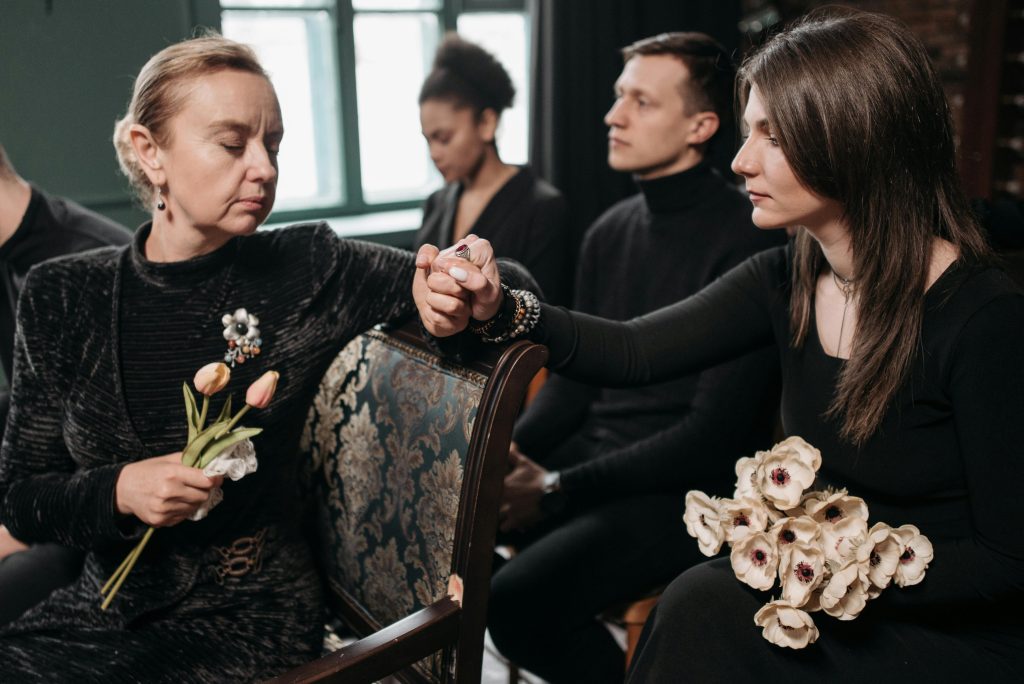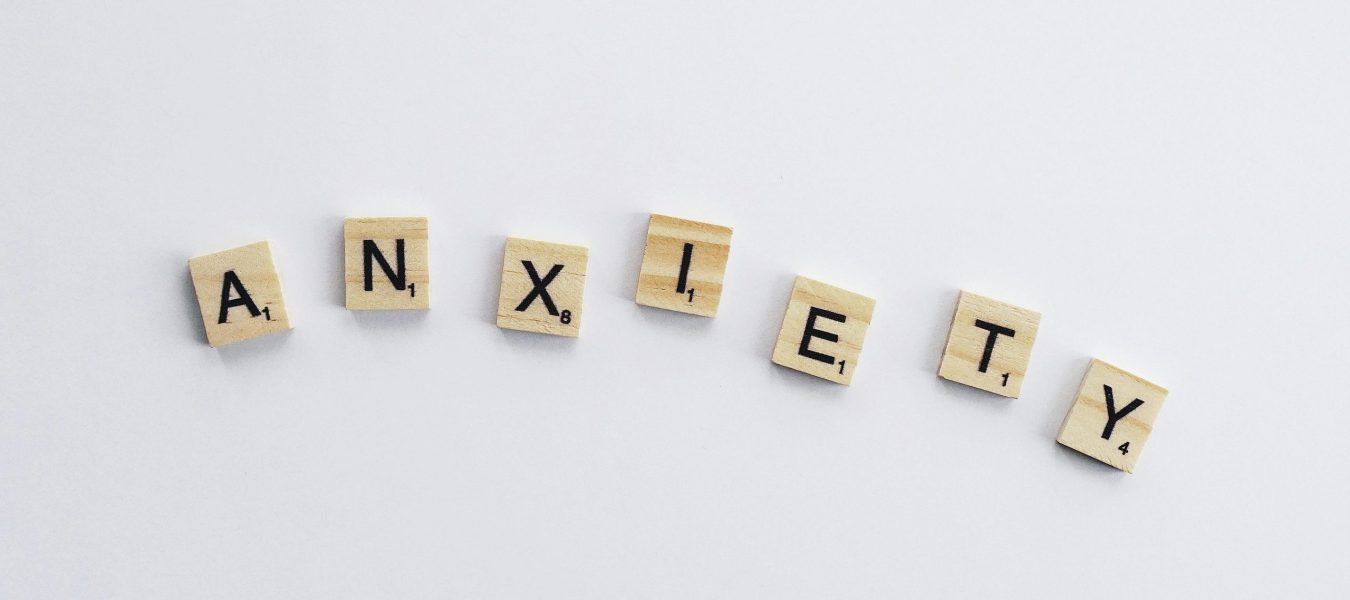Grief can be an overwhelming and isolating experience, but there are ways to cope with it and find support. Here are some steps that may help:

Allow Yourself to Grieve: Grief is a natural response to loss, and it’s important to give yourself permission to feel whatever emotions arise. It’s normal to experience sadness, anger, confusion, or even relief, and there’s no right or wrong way to grieve.
Practice Self-Care: Grief can be physically exhausting. It’s important to take care of your body by eating well, staying hydrated, getting rest, and engaging in gentle physical activity. Try to find small moments of comfort, whether it’s through a walk, reading, or a favorite activity.
Give Yourself Time: There is no timetable for grief. It can be a long and unpredictable journey. Be patient with yourself and recognize that healing doesn’t mean forgetting the person or thing you’ve lost. It means learning to live with the loss in a new way.
Express Your Feelings: Writing in a journal, creating art, or engaging in other forms of expression can help process your emotions. Sometimes, when words are hard to find, expressing grief through creativity or rituals can provide comfort.
Honor the Memory: Find ways to honor the person or situation you’ve lost. This could be through a memorial, a personal ritual, or even by carrying forward a lesson or value they taught you.
Additional resources that may helpful include:
Professional Help: A licensed therapist, grief counselor, social worker or psychologist may be helpful when processing the complex thoughts and emotions associated with grief. Psychiatrists, primary care providers, and psychiatric nurse practitioners may be of help with the physical symptoms of grief including insomnia, panic attacks, and depression.
Support Groups: Organizations such as hospice have support groups which are often led by someone who has experienced the grieving process. Many supports are now virtual for those who may not be ready to leave home.
Faith Groups/Counseling: These groups can assist with integrating faith into the grieving process.
Community Resources: Senior centers, hospitals, funeral homes, or local board of health may offer grief support or organizations that may be helpful.
Grief Specific Groups: Compassionate Friends has chapters in each state and offers groups for bereaved parents. Groups exist for grief associated with death by suicide, murder, spousal loss and military loss.

Resources for Anxiety and Related Disorders
Anxiety disorders are a group of mental health conditions characterized by excessive, persistent, and often overwhelming feelings of fear, worry, or nervousness. These feelings can interfere with daily activities and may lead to physical symptoms like increased heart rate, sweating, and trembling. There are several types of anxiety disorders, each with its own specific symptoms and triggers. The most common types include:

Anxiety Disorders
Anxiety disorders can cause significant distress, but they are treatable through various methods. The key is finding out what helps YOU. It could be yoga, walking in the woods, being with friends, meditating, etc. Managing anxiety is not a “one size fits all” approach. Often, the most effective treatment plan involves a combination of therapies. For example, a person may undergo CBT while taking medication to help manage symptoms in the short term. Working with a healthcare provider to develop a personalized treatment plan is essential for finding the most effective approach.
Treatment outcomes vary depending on the individual, but many people with anxiety disorders experience significant relief through these strategies.
- Generalized Anxiety Disorder (GAD): Characterized by excessive, uncontrollable worry about various aspects of life, such as work, health, or social interactions. This worry lasts for months and can interfere with daily functioning.
- Panic Disorder: Involves recurrent panic attacks, which are sudden periods of intense fear or discomfort. During a panic attack, individuals may experience symptoms like chest pain, rapid heart rate, shortness of breath, and a feeling of impending doom.
- Social Anxiety Disorder (Social Phobia): This disorder involves intense fear of being judged or scrutinized in social situations. Individuals may avoid social interactions or experience extreme anxiety before and during them.
- Specific Phobias: These involve an intense fear of a specific object, situation, or activity, such as fear of heights, spiders, or flying. The fear can be out of proportion to the actual threat posed by the phobia.
- Agoraphobia: This is the fear of being in situations where escape might be difficult or help unavailable if a panic attack occurs. It often leads to avoidance of places like crowded areas, public transportation, or leaving home.
- Separation Anxiety Disorder: Most commonly diagnosed in children, this disorder involves excessive fear or anxiety about being separated from loved ones or familiar surroundings. However, it can also occur in adults.
- Post-Traumatic Stress Disorder (PTSD): PTSD can develop after someone experiences or witnesses a traumatic event. Symptoms include flashbacks, nightmares, hypervigilance, and emotional numbness.
Here are the most common treatment options your prescriber
and therapist may recommend:
Cognitive Behavioral Therapy (CBT)
- CBT is one of the most effective forms of therapy for anxiety disorders. It focuses on identifying and changing negative thought patterns and behaviors that contribute to anxiety. CBT helps individuals challenge irrational fears and replace them with healthier ways of thinking and coping.
- Techniques include exposure therapy (gradually facing fears in a controlled way) and cognitive restructuring (challenging unhelpful thoughts).

Medications
-
Antidepressants: Selective serotonin reuptake inhibitors (SSRIs) and serotonin-norepinephrine reuptake inhibitors (SNRIs) are commonly used to treat anxiety disorders, as they help regulate the brain chemicals associated with mood and anxiety.
Examples include fluoxetine (Prozac), sertraline (Zoloft), escitalopram (Lexapro), and venlafaxine (Effexor). - Benzodiazepines:These are fast-acting medications for short-term relief of anxiety symptoms, often prescribed for acute anxiety or panic attacks. However, they are usually not recommended for long-term use due to the risk of dependence. Examples include lorazepam (Ativan) and alprazolam (Xanax).
- Buspirone: A non-benzodiazepine medication used for generalized anxiety disorder (GAD). It may take a few weeks to see effects but has a lower risk of dependence than benzodiazepines.
- Beta-blockers:These can help manage the physical symptoms of anxiety, such as rapid heart rate and shaking, particularly in situations like public speaking. An example is propranolol.
Mindfulness and Relaxation Techniques
- Mindfulness meditation helps individuals stay present and reduce excessive worrying. It can also increase awareness of bodily sensations, allowing better control over anxiety.
- Deep breathing exercises, progressive muscle relaxation, and guided imagery can help reduce physical symptoms of anxiety by promoting relaxation and slowing down the body's stress response.
- Yoga and tai chi also combine movement, breath control, and mindfulness, which can be helpful in managing anxiety.
Exposure Therapy
- A specific type of CBT, exposure therapy involves gradually and repeatedly exposing the person to the feared object or situation in a controlled manner, allowing them to learn that the feared outcome is unlikely or less severe than imagined. Over time, this reduces anxiety associated with fear, i.e, fear of vomiting.
Lifestyle Changes
- Regular exercise: Physical activity can reduce anxiety by releasing endorphins, improving mood, and helping to regulate sleep. Even a daily walk or light exercise can have significant benefits.
- Healthy diet: A well-balanced diet with adequate nutrients can improve mental health. Limiting caffeine, alcohol, and sugar may help reduce anxiety symptoms.
- Adequate sleep: Poor sleep can worsen anxiety, so maintaining good sleep hygiene is crucial for managing symptoms.
- Social support: Spending time with friends, family, or support groups can help reduce feelings of isolation and provide emotional comfort.
Support Groups
- Group therapy or support groups provide a platform for individuals with anxiety disorders to share experiences, coping strategies, and emotional support. This can help reduce feelings of isolation and stigma.

Alternative Therapies
- Some people find relief through complementary therapies, such as acupuncture, aromatherapy, or the use of certain herbal supplements (e.g., valerian root, chamomile, or lavender). However, it's important to consult with a healthcare provider before starting any alternative treatments to avoid interactions with other medications.
Self-help Strategies
- Journaling can help people process their emotions and identify triggers for anxiety.
- Time management techniques can reduce stress by helping individuals manage tasks more effectively
Resources for Anxiety
McLean Hospital OCD Institute: 115 Mill Street, Belmont, Ma (617) 855-2776 OCD Institute at McLean Hospital – A Center for Children & Adults
Book Recommendations
Don’t Believe Everything You Think: Why Your Thinking Is the Beginning & End of Suffering. Joseph Nguyen.
The Art of Letting Go: Stop Overthinking, Stop Negative Spirals, and Find Emotional Freedom. Nick Trenton.
Rewire Your Anxious Brain: How to Use the Neuroscience of Fear to End Anxiety, Panic and Worry. Catherine Pittman.
A New Earth. Eckhard Tolle.
Meditation for Fidgety Skeptics. Dan Harris.

